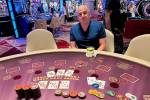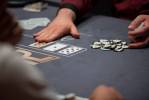Poker champ avoids high stakes
In many ways, Jerry Yang is poker's accidental world champion.
The slightly built, soft-spoken, born-again Christian and Laotian immigrant still considers himself just a novice player, four years after his bank account grew by $8.25 million when he won the World Series of Poker's Main Event in 2007.
Yang, 42, doesn't like playing in high-stakes poker games where buy-ins often run from $50,000 to $100,000. It's not a good investment.
"I'd still be the least-experienced player at the table," Yang said Wednesday.
Instead, Yang focuses on smaller stakes games and charitable events. He donated roughly 10 percent of his World Series of Poker winnings to charity following his win in the $10,000 buy-in No-Limit Hold'em World Championship.
"Charity is very important to me and my family," said Yang, who was a psychologist and social worker when he became the World Poker Champion. He even missed the start of the 2008 World Series of Poker tournament because the first event conflicted with a charity poker tournament he was hosting for the Make-A-Wish Foundation.
Yang is planning to compete in the 2011 World Series of Poker's Main Event, which kicks off today. But he also used the tournament to launch publication of his autobiography, "All In: From Refugee Camp to Poker Champ."
The book intertwines the play-by-play of Yang's march through the 2007 Main Event with tales of his and his family's immigration from Laos in the mid-1970s after fleeing the communist takeover.
Yang spent more than four years in a refugee camp in Thailand before arriving in the United States in 1979 at the age of 13, growing up in Nashville, Tenn., and learning to speak English.
"My story is very unique," Yang said. "It's about surviving just to get to the United States and surviving at the poker tables. The title pretty much says it all because my family went all in just to get to the United States."
Yang recounts how both his wife, Sue, and his father were opposed to his quest to play poker, which began when his family lived in Riverside County, Calif., and he was playing in Indian casinos .
His father, a farmer from a small Hmong village who once saved a downed American fighter pilot, was opposed to any form of gambling.
"Today, he's my biggest fan," Yang said.
Before winning the 2007 World Series of Poker Main Event, Yang had been playing poker competitively for only a few years. He spent $225 to enter a satellite tournament at the Pechanga Casino in Temecula, Calif., which earned him a seat in the Main Event.
Yang outlasted a field of 6,358 players over 11 days at the Rio, entering the final table of nine in eighth place. However, Yang mowed through the 16-hour final table and personally eliminated seven of the competitors.
The book concludes with several chapters documenting Yang's poker strategies, including top rookie mistakes.
Poker is still important to Yang, but it's almost secondary now. He moved his wife and six children between the ages of 7 and 16 to Fresno, Calif., to be closer to extended family. He is no longer a psychologist, but opened a restaurant, "Pocket 8s Sushi and Grill" in Merced. The restaurant is named for his final hand at the Main Event.
Yang has played at the World Series of Poker since winning the title, but has only cashed in three events, all in 2010. His best finish was 57th in a No-Limit Hold'em/Six Handed event in which he won $7,273.
Yang said he has already earned a seat at the Main Event by winning a satellite at the Rio. This year Yang has already played in four World Series of Poker events without any cashes. Three times, Yang said, he was eliminated by players holding three-of-a-kind.
"Hopefully, my luck is getting better," Yang said.
Contact reporter Howard Stutz at hstutz@reviewjournal.com or 702-477-3871. Follow @howardstutz on Twitter.
42nd World Series of Poker Main Event
Buy-in: $10,000
Game: No-limit hold'em
Starting days: Thursday through Sunday
Day 2: Monday (Thursday and Friday qualifiers); Tuesday (Saturday and Sunday qualifiers)
July 14-July 18: Main Event Days 3 through 7
July 19: Final table of nine players is determined
Nov. 5-7: Final table is played
Where: Rio
Starting times: Noon every day
2010 Main Event Entries: 7,319 players
2010 Main Event Prize Pool: $68.8 million
2010 Defending Champion: Jonathan Duhamel of Quebec, Canada (won $8.94 million)
SOURCE: World Series of Poker




























